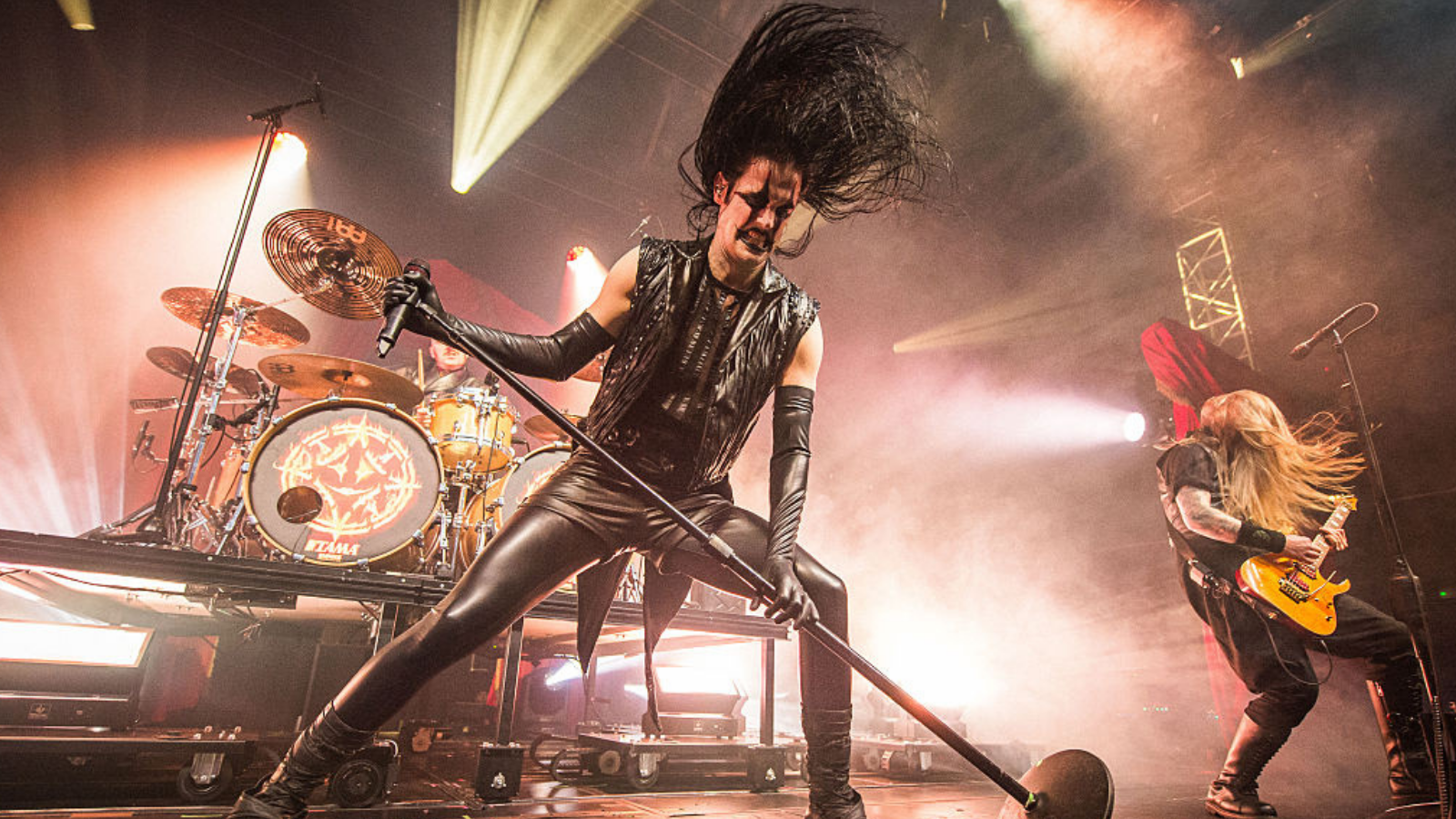Sexual harassment at gigs: how we can help stamp it out
We talk to Good Night Out founder Bryony Beynon about how you can help stop sexual harassment if you spot it within your music community

Select the newsletters you’d like to receive. Then, add your email to sign up.
You are now subscribed
Your newsletter sign-up was successful
Want to add more newsletters?

Every Friday
Louder
Louder’s weekly newsletter is jam-packed with the team’s personal highlights from the last seven days, including features, breaking news, reviews and tons of juicy exclusives from the world of alternative music.

Every Friday
Classic Rock
The Classic Rock newsletter is an essential read for the discerning rock fan. Every week we bring you the news, reviews and the very best features and interviews from our extensive archive. Written by rock fans for rock fans.

Every Friday
Metal Hammer
For the last four decades Metal Hammer has been the world’s greatest metal magazine. Created by metalheads for metalheads, ‘Hammer takes you behind the scenes, closer to the action, and nearer to the bands that you love the most.

Every Friday
Prog
The Prog newsletter brings you the very best of Prog Magazine and our website, every Friday. We'll deliver you the very latest news from the Prog universe, informative features and archive material from Prog’s impressive vault.
Last week, in response to a series of allegations of sexual assault levied against a variety of musicians, TeamRock reported on the ‘epidemic’ levels of abuse happening within our music communities. As part of that story, we spoke with Bryony Beynon, a music fan and musician who founded the Good Night Out Campaign. Now, Beynon has shared with us with a series of tips and practical advice on how we can all make gigs safer experiences for everyone.
Believe people when they come forward about abuse
“The biggest thing is to listen when your female friends speak up, and believe them without hesitation,” says Beynon. “Ask what you can do to help, and if they give you permission, challenge the person who’s hurt them. The only reason there is a constant sense of silence is because we fear not being believed or being cast out of music scenes, which is all too common – but sexual harassment and sexual assault are at epidemic levels. Women who love music or play it, whether for fun or for work, already know this. Part of this is why I set up the Good Night Out Campaign in 2014. We’re an independent network of trainers, many of whom are also in bands, working with venues and festivals (as well as clubs, bars and student unions) to help them deal with, tackle and prevent harassment through a training programme and poster campaign, and we’ve trained over 150 venues worldwide.”
If someone feels targeted, threatened or less than welcome because of who they are, we have to speak up and take notice.
Practice challenging behaviour which makes you feel uncomfortable
“If you’re a man and you’d like to make a difference, there’s so much you can do [to encourage change],” says Beynon. “At its root, this is about women and gender non-conforming people being devalued. So simple cultural changes can be huge. Seek out and support bands led by women, queer and gender non-conforming people. Challenge sexist stereotypes wherever you see them. Challenge your mates on their sexist banter. Practice saying ‘Mate, that’s a bit sexist’ or ‘That’s a shitty thing to say.’ Heading to a festival? check out how gender equal the lineup is. If it isn’t, demand better from promoters and vote with your wallet. Remember, a queer black woman invented rock’n’roll, so don’t fall for excuses. Does your favourite brand of guitar or amps still use women’s bodies to sell their product? Ask them why. Get in touch with your local venue and see if they would be willing to join the Good Night Out Campaign. All sexual harms exist on a spectrum. Each and every small comment which passes by without challenge because you felt awkward calling it out or figured it wasn’t a big enough deal actually creates what we call a ‘conducive context’ for much more serious harm.”
Be more aware of what counts as harassment and assault
The latest news, features and interviews direct to your inbox, from the global home of alternative music.
“UK law defines sexual assault as non-consensual touching of a sexual nature of another person’s body,” explains Beynon. “It actually doesn’t have to be on an intimate part of your body, because it’s about the intent behind the touch. Sexual harassment if its verbal or non-verbal (like staring at someone, or writing about them online) is defined in civil (rather than criminal) law as any act that could violate someone’s dignity, or create an intimidating, hostile, degrading, humiliating or offensive environment for them. So if there’s any touching, it’s assault. Rather than looking only to the law, which can be very broad, we should be really be focusing on actions that makes people feel uncomfortable by targeting them because of their gender or sexuality, actual or perceived. If someone feels targeted, threatened or less than welcome because of who they are, we have to speak up and take notice.”
- Weinstein's just the start: the abuse of women in music is at 'epidemic' levels
- Our TeamRock+ offer just got bigger. And louder.
- The Audio Archive – exclusive to TeamRock+ members
- Twiggy Ramirez fired from Marilyn Manson’s band amid allegations of sexual abuse
What can I do if I see someone being harassed at a show?
“Practice being an active bystander,” says Beynon. “We all know that gut feeling when something’s not right, but double check your instincts. Is something dodgy definitely happening? What’s making you concerned? Get a second opinion from a mate if you’re not sure.”
“Then, assess the safety. If you step in, will you help or harm? If a situation looks like it’s already getting out of hand – for example, if there are more than three people involved already – then letting a member of security staff know will be much more effective than adding your voice to the conflict. Alternatively, you may be the only witness to unwanted touching, which without your help will be very difficult for the victim to prove. Letting them know you saw what happened and that it’s not okay will be very helpful if they want to get away from that situation or confront the person doing it.”
“Check in with the person you think is being targeted. If it’s loud, you can try a thumbs up or making eye contact instead. Be neutral and friendly. Remember, it’s not about taking over the situation. You’re offering support and showing that you’re keeping an eye out. If there’s no problem and they’re all good, you’ve lost nothing! Once you’ve checked in, you might need to step in, but remember: safety first. Distraction is a subtle, low-risk and fun way to step in. You can sneakily derail the harassment by interrupting it. Try to ignore the harasser and focus on whoever is being targeted.”
There are a few low-risk ways to intervene when you see something happening, says Beynon. “You could strike up a conversation about the bands or ask who’s on next, get in the way and dance between them or create a distraction, pretend you know the person being harassed and start up a conversation or offer to walk away with them, go and get some water, or join your mates.”
“Often, it’s enough to just start chatting to the person who is being targeted, changing the subject and putting yourself between the two of them, and they will get the message. If someone does ask you to intervene directly, then after checking that it’s safe to do so, use non-confrontational body language to let the harasser know that their behaviour is not okay. The most important thing here is to keep it short and succinct. You’re not starting an argument or a debate. Aggro is not going to help and could make the person who was targeted feel even more unsafe. Make your point and then move away, perhaps with the person who’s been targeted if that’s appropriate.”
“If you are asked for other practical help and it’s safe to assist, make an effort to do so. Remember, they might be feeling embarrassed or distressed and just need someone to stand with for a little while. Can you offer to help them find security, or go and inform a member of staff about what you’ve seen? Do they need help to find a first aider? Have they lost their mates and need help to find them?”
Don’t let alcohol be an excuse
“Remember, alcohol is not an excuse. We worked with Drinkaware recently to put together some tips for stepping in when you witness harassment on a night out. Don’t forget to check yourself, too: am I giving this person space to enjoy the gig, which is what they are here for? Or am I crossing their boundaries?”
If you feel uncomfortable, try to find a member of staff
“If you ever feel uncomfortable at a gig, it’s worth letting staff know if you can,” says Beynon. “If you feel like it, write a follow up note to the venue to let them know if you had a good or bad experience when you spoke up. Educating bands and performers about the behaviour of their fans is also a big way to make change, which initiatives like Safe Gigs For Women do a great job of highlighting.”
Festival websites go dark for campaign against sexual assault
Beach Slang remove guitarist amid sexual assault allegations
Swedish police hunt festival gang who carried out 35 sexual assaults
Briony is the Editor in Chief of Louder and is in charge of sorting out who and what you see covered on the site. She started working with Metal Hammer, Classic Rock and Prog magazines back in 2015 and has been writing about music and entertainment in many guises since 2009. Her favourite-ever interviewee is either Billy Corgan or Kim Deal. She is a big fan of cats, Husker Du and pizza.

